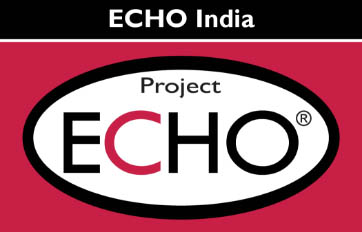As India went into a national lockdown on 24th March 2020, the life of 1.3 billion people came to a standstill. The pandemic not only altered the way we live and work but also severely impacted the country’s healthcare system, especially in rural areas. One of the foremost challenges facing the healthcare community was the lack of preparedness and knowledge about this deadly virus that was killing hundreds of people each day.
The need of the hour was to familiarize frontline health workers with techniques, protocols, and methods to diagnose and treat patients effectively. This required quick and efficient mobilization of resources, especially in the underserved areas of the country. So, when ECHO India launched its first COVID-19 training program in 2020, over 1,000 participant slots filled up in under five minutes as healthcare professionals were eager to learn about intensive care unit practices for their patients.
Similarly, the slots for a training session on alternative medicine and COVID-19 were booked in less than a minute. The primary reason behind this significant response to ECHO India’s COVID-19 training series was the healthcare system’s lack of preparedness, which was accompanied by the need for emergency response. At a time when COVID-19 cases were rising at an alarming rate in India, the ECHO sessions were proving to be a valuable, time-saving, and critical resource.
During the peak of the COVID-19 pandemic and subsequent waves, more than 7,80,000 attendees were recorded on the ECHO platform, both for COVID-19 management as well as COVID vaccination advocacy
Moreover, the demand was so great for ECHO India’s telementoring model that it switched to hosting webinars to accommodate up to 10,000 participants. This was an essential step that provided healthcare workers with access to virtual capacity-building sessions for COVID-19 diagnosis, treatment, vaccination, and more.
Nearly all of ECHO India’s 56 training centers focused their efforts on quickly and effectively disseminating information about Covid-19 care and treatment. These training centers taught providers across 318,000 participant centers about Covid-19 response best practices - which included infection prevention and control, Covid-19 care guidelines, ventilator management, mental health support, and laboratory guidance and diagnostics.
COVID-19 Hub Count
The programs trained more than 400,000 healthcare professionals, including medical practitioners from remote villages to doctors and nurses working in urban Indian cities.
“People understood the power of the ECHO model as a way to respond to Covid-19, and it went viral,” said Dr. Sunil Anand, Executive Director of ECHO India.
Additionally, in the initial stages of the Covid-19 pandemic, preventive measures were critical to contain the virus’ spread, making safety protocols like frequent hand sanitization, practicing respiratory hygiene, and maintaining social distancing paramount.
Empowered with knowledge gained through attending ECHO sessions, thousands of village healthcare workers, including nurses and midwives, went door to door in remote villages to educate residents on Covid-19 and how they can protect themselves and their families. While these healthcare providers did not have any personal protective equipment, they did their best to maintain distance and regularly sanitize their hands.
“For these providers, a lot of the training was on how to talk about COVID,” says Dr. (Col) Kumud Rai, Chairman of ECHO India. “Why do we need social distancing? How do we do handwashing properly? If Covid can be killed with soap, then why are you having such a difficult time with it?”
ECHO India also trained tens of thousands of government water sanitization workers to serve as public health messengers in remote areas. In addition, doctors, nurses, and other medical professionals learned about key COVID fundamentals, such as what to do with patients who have a cough, how to deliver oxygen, and when to put a patient on the ventilator - all of which were crucial to stabilize the ground-level situation.
“Remember, nobody had treated patients with COVID before,” Dr. Anand said. “We had to explain how to implement best practices.”
Crucial to ECHO’s success was the foundation laid by the Indian government, as it had previously signed a partnership agreement with ECHO India to make the ECHO model the government’s official training platform for all healthcare workers. Because of that foundation, ECHO India was able to respond to the COVID-19 crisis quickly while the country was on lockdown.
This article was first published on Project ECHO website (Click here to view).
